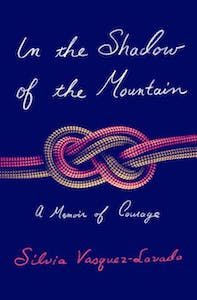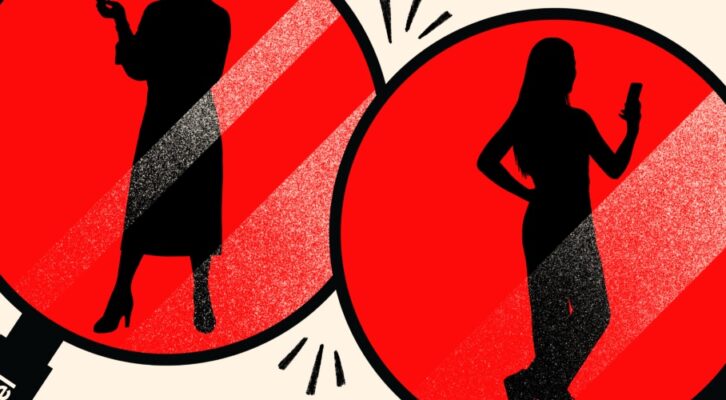Confronting the Old Boys’ Club at Everest Base Camp
Silvia Vasquez-Lavado Considers the Strength of Surrender Up the Mountain
I’m the only girl in the boys’ club and I’m late.
The Adventure Consultants dining tent is hookah-lounge chic, a level of kitsch that at 18,000 feet looks like luxury if you squint. Bright bouquets of plastic flowers hang from the structural poles holding up the tent, a trio of egg chairs are clustered around a cozy electric stove, and two rectangular dining tables are set with bright oilcloth coverings, all the chairs draped in a psychedelic purple fabric.
The first table is already filled with very manly, very white, mostly balding men, cracking jokes and hollering over each other. Given that I’ve spent most of my life being afraid of men, I’ve picked an odd sport. Elite mountaineering draws out the most primal machismo characters I’ve ever seen.
Everyone seems to have their spots picked out already. Suddenly, I’m back in high school. At the back of the class. I take a deep breath and approach the other table.
“Hi, I’m Silvia,” I say, waving. “Very nice to meet you all.”
“Bloody day, you finally made it!” says a brown-haired tank of a man with an Australian accent. “We were about to give Danny the rest of your food supply.”
The table breaks into laughter. I smile politely, trying not to be sensitive, but after leaving the girls, I’m a walking heart.
“Brian,” he says, extending a hand, which I make sure to shake firmly. “Nice to see you. New Zealand by the way. The accent? In case you were wondering.” Brian is also climbing the Seven Summits. Everest and Denali are the last on his list.
“I’m Rob,” says a man with a short white beard and what I guess is another Australian accent, but I’m wrong again. Rob is an engineer originally from New Zealand but based in Adelaide. He’s on his third Everest attempt. “Sit here. I have something for you,” he says, dragging an empty chair over from the other table. He pulls a stuffed koala bear from a plastic bag.
“For me? Thank you,” I say, a nervous smile plastered to my face. “That’s so thoughtful.” I’m unsure what to make of it, but Rob seems sensitive to the fact that I’m the only woman. Maybe he thinks a stuffed animal will help.
Who knows, maybe it will.
As we wait for dinner to arrive, the men barrel through the rest of the introductions. I try to keep up.
Tom, a balding white-haired man with a stringy, muscular neck, stands to introduce himself.
“If any of these hooligans give you trouble,” he barks, “I’ll set them back straight!”
“Keep an eye on old Tommy boy, you never know when he might be interrogating you,” cracks Brian.
Turns out that Tom isn’t just any military guy. He’s a former member of the Navy’s SEAL Team Six. He’s also an ultramarathon runner who once completed two Ironman Triathlons in one day. As Tom lists his accomplishments, I feel myself shrinking. This is his first Everest attempt, but he seems very confident.
Next to Tom is Gabe, an Australian police chief, who jumps up in the middle of his introduction to bounce a soccer ball on his knee. “I’m planning to kick this guy around at summit. That’s how you’ll know it’s me. Bouncing at 30,000 feet!”
“Oh, come off it, sit your ass down!” says Brian. Brian. Seven summits, I think, trying to remember who is who.
My mouth falls open as the next man at the table stands to introduce himself. He must be close to seven feet. “Danny,” he says. “Kiwi. Second summit attempt. First one was last year. During the avalanche. Devastating. Rob, there—koala man—was here as well.”
The 2015 avalanche was Everest’s most deadly. It killed twenty-four people and decimated the small citadel that is Base Camp. Not a single climber made it to summit that spring. It was the first time in forty-one years that that had happened.
“Were you in the avalanche?” I ask. “Not buried under it,” says Rob.
Koala bear Rob. Koala bear Rob.
“But we were caught at Camp 1 when the earthquake hit. We prepared ourselves to die that day.”
I let out a low whistle. “I can only imagine,” I say.
At the second table is John, a British financier who lives between Hong Kong and Tokyo—two of my favorite cities. His posh accent and square horn-rimmed glasses say professor, not mountaineer. He’s on a private expedition housed within Adventure Consultants, and has hired Lydia Bradey, the first woman to successfully climb Everest without oxygen, as his main guide.
And finally, next to John, is Mark, a college professor who lives in Connecticut. Mark has a kind face and is more reserved than the others. He exudes a sort of gentleness that I’m grateful for after all the bravado. This is his first Everest attempt too.
Mike walks into the dining tent. I’ve met Mike only once, briefly, at the puja.
“Welcome, welcome, Silvia,” he says. “Our team is now officially complete.” He grins, his smile lines more like fault lines, deep creases extending from the corner of his eyes all the way down his cheeks.
“Thank you,” I say quietly.
“Tell us a bit about where you’ve come from.”
“Of course,” I say, beaming with pride. I clear my throat and stand. “For the last ten days, I’ve been guiding a group of courageous young women to Base Camp. Women who, like me, have been victims of sexual violence. The hike was about getting in touch with their inner strength. I wanted Everest to show them how powerful they are. They’re heading back down the mountain now. And I will continue here. With you.” I finish with a flourish of the hand. “Inspirational,” says posh John, lifting his eyebrows. I can’t tell if it’s sarcasm or his dry British tone.
“Whew,” whistles Navy SEAL Tom. “You must be exhausted.”
“No kidding. Certainly not how I’d prep for Everest,” says Gabe, the summit soccer jock. “You need to be on your A-game here. Guess we’ll see how long you last.”
His eyes are jovial, and everyone laughs, but something tells me he means it.
“Yes,” I say with a smirk. “Yes, we will.”
But he’s right. I am exhausted. Not just physically depleted but emotionally.
Two young Sherpa men rush into the tent carrying steaming trays of food and a big pot of soup. Tendi, the expedition chef, runs down the night’s menu: French fries, rice, dal, fried chicken.
“Okay, show-and-tell is over,” booms Danny. “I’m starving. Let’s eat!”
The first table stands, and we line up to serve ourselves buffet-style. Rob is in front of me and tries to put a piece of chicken on my plate.
“No thank you,” I say, loud enough for everyone to hear. “I’m a vegetarian.” “Aww, a veggie, eh?”
“Well, on the mountain at least. And you?” “Never.”
“Anyone else?” I look up and down the line. “Nope.”
“Hell no.”
“Carnivore reporting for duty!” “Bloodier the better in my book.”
Not only am I late and the only woman, but I’m the only vegetarian. A lesbian vegetarian allergic to gluten—the ultimate cliché pain in the ass. I almost can’t stand myself, but I’m too hungry to dwell on it. Head down, I dig into a bowl of oily fries, rice, and more dal bhat. As the Sherpas say, “Dal bhat powers, twenty-four hours.” What’s good enough for the Sherpas is just fine for me.
Again and again, mountains have shown me that strong is not the opposite of soft. That they are symbiotic. Strength alone is not enough.The table thrums with testosterone—the live-wire energy of Survivor meets barroom arm wrestling. Trying to keep up with the dinner banter is like joining a story already in progress. While I’ve been focused on the girls, they’ve been acclimatizing, talking routes and gear, and trading war stories—literally.
It’s clear that the next six weeks is going to come with a healthy dose of competition.
I finish eating quickly and pull on my coat. “I’m pretty beat, all. Going to get some rest.” As I duck out of the stuffy tent and rush through the dark, frigid air of camp, panic sets in.
They’re cast straight from a James Bond movie. A British millionaire? A rugby player? A seven-foot-tall Kiwi? SEAL Team Six? My God. My God. What the hell have I done?
I can’t believe I’d ever been afraid of leading the courageous girls. I yearn for the tenderness we shared just hours before. For a decade, I’ve been working toward the big dream. “One day I’ll climb Everest,” I told myself and anyone who would listen. Well, “one day” has arrived, and even after all the climbing and training, all the delays and heartbreaks, I’m not prepared because I didn’t just focus on that one day.
I unzip my tent and dive in, crawling into my sleeping bag. Once I’m cocooned in down, my eyelids are lead. I hope the girls made it safely back to Gorak Shep. I should call and check on them, but my phone doesn’t have reception, and I can’t go back to the dining tent.
Too tender. Too scared. Too tired. Too… too. Tired. The blissful nothing of sleep washes over me.
“Silvia, Silvita! Wake up, levántate!”
My eyes open a slit. My mother is over me, shaking me, in bed. “There’s been a bomb,” she says, pulling me out from the covers. She runs down the stairs ahead of me. I’m watching my steps, trying not to slip, eyes barely open. In the courtyard, my family is standing in their pajamas.
“Silvia!” bellows my father. “The girl sleeps through anything. Even a goddamn bomb.”
“They’re getting closer,” says my mother, caressing my hair.
I bolt upright. I’m zipped up to the throat in a mummy bag. My breath is an icy cloud. Somewhere in the distance there’s a machine gun rat-a-tat. Avalanches. There are avalanches out there. I’m on Everest, not in Peru.
But Peru, it seems, is always with me.
I shake off the dream and wonder about the girls again. I hear a small ping and fumble around in the dark tent for my satellite device. Texts from Shailee light up the screen.
We are all good.
Everyone in great spirits.
Go and sleep, you must be tired. We will talk tomorrow.
As I collapse into my pillow, a weight is lifted from my chest. All the space the girls have occupied for the last two weeks, two months really, as I got sober in San Francisco and funneled my energy into training and logistics, is empty now. In the space I held for them, old fears flood back in.
Everyone—me, most of all—likes to say that struggle makes you strong. I’ve lived, and practically died, by the ethos that to survive is to overcome. But again and again, mountains have shown me that strong is not the opposite of soft. That they are symbiotic. Strength alone is not enough. It may get me to the summit, but back at sea level, I’ll still be adrift.
And now the courageous girls have shown me that I can bow at the feet of lamas and nuns, speak the language of the New Age, wear all the shawls and rosaries and prayer beads, and adopt the vernacular of healing, but as long as I neglect the muscle of softening, I will still be conquering where I wish to surrender.
I sob myself quietly back to sleep. Behind the thin skin of my eyelids, in dreams fraught with danger, massive hunks of ice tumble toward me, gaining momentum, exploding into waves of snowy powder. The cracking of the avalanche morphs into wailing alarms and explosions. I’m back in Peru. Men and bombs. The twin explosions of my youth. Where anything could crumble at a moment’s notice.
_________________________________________________________

Excerpted from IN THE SHADOW OF THE MOUNTAIN: A Memoir of Courage by Silvia Vasquez-Lavado. Published by Henry Holt and Company. Copyright © 2022 by Silvia Vasquez-Lavado. All rights reserved.




















